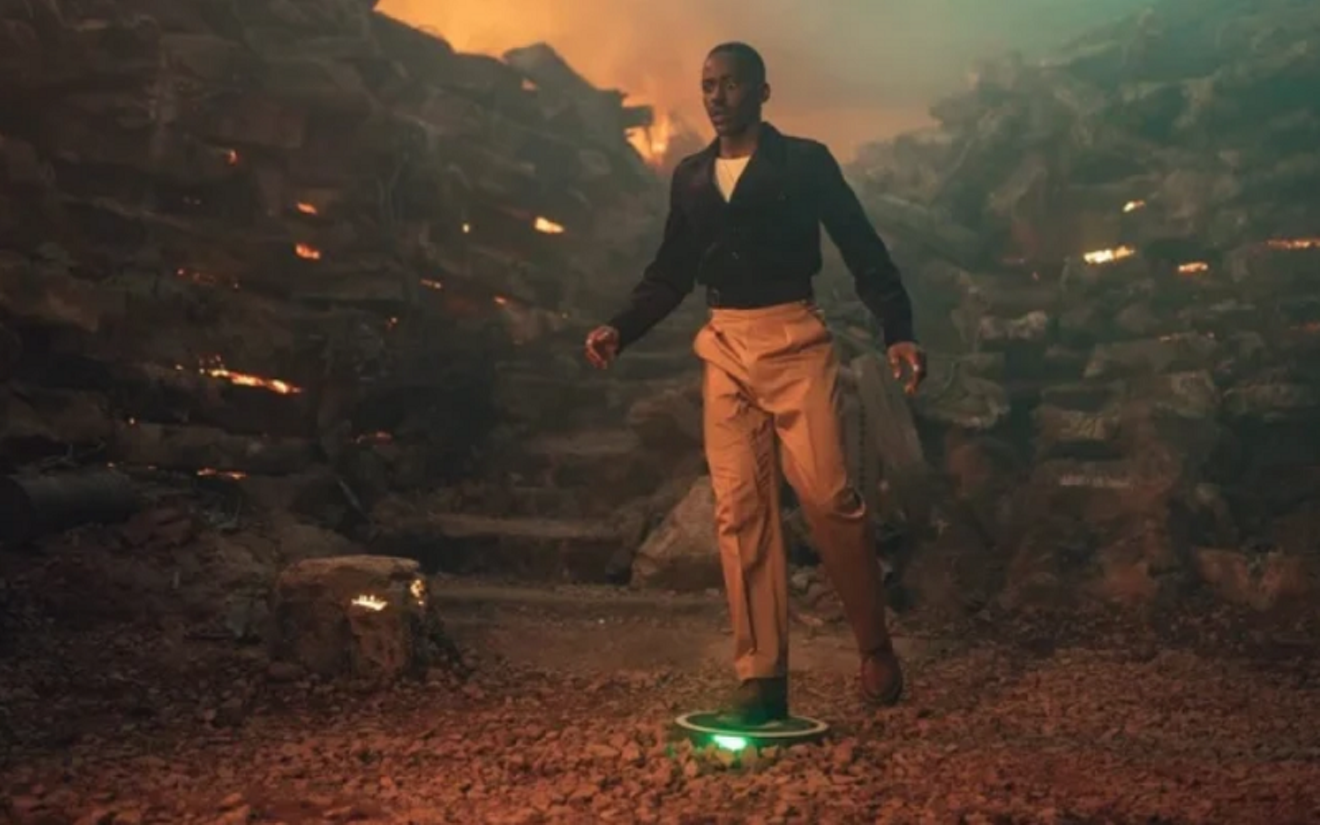In the latest episode of Doctor Who, “Boom,” the show re-establishes itself as a counterculture marvel.
Like a lot of fans, I was leery about the return of Steven Moffat to the writing team at Doctor Who. Yes, he is responsible for some of the greatest episodes in the history of the series, but by the end of his tenue as showrunner, there seemed little left for him to say.
Turns out he has quite a lot to say, even as he made sure to drop references to his own old work. The Doctor and Ruby land on an alien planet in the middle of a war. Drawn by the sound of screams, The Doctor steps on a landmine. The rest of the episode is essentially him trying to talk his way out of a planet-destroying catastrophe with him at the epicenter.
In doing so, he has to convince an army (the weird Anglican Marines from “Flesh and Stone”) that they are fighting not only a pointless war, but one that is entirely driven by an algorithm from an arms manufacturer. The main villain of the episode is a robotic ambulance that eliminates soldiers deemed too injured to be profitable in the war. Afterwards, even their memories are commodified, an AI used to comfort next of kin, so they don’t think too hard about the cost of war.
One of the main complaints of the Chris Chibnall/Jodie Whittaker era of the show was how weak its social criticisms were despite being supposedly an insatiable woke monster determined to eat civilization as white dudes know it. Her adventure against an eviler Amazon stand-in waffled at full support of worker rights. When Daleks became part of the London police, the show made sure it wasn’t because the police were totally the first group of people who would use Daleks against protestors and regular citizens. No, it had to be an evil alien intelligence.
Those days are over. From his precarious position on the landmine, The Doctor gently, but firmly, touches on a variety of important topics like a science fiction Sermon on the Mount. He ridicules the fact that the soldiers have never actually seen the enemy they are fighting and reminds them that they are perfectly aware of the hypercapitalist nature of the weaponry they use. Not even their faith is spared, as The Doctor has one of his few cruel moments and calls it the opposite of thought.
It's just so earnest. There is no hesitancy in the writing. The Doctor knows that all this is wrong, and while he has sympathy for the people caught in it, he makes no apologies calling out the wrongness itself. For a guy trapped on one foot for a lot of the run time, he strides forward unwaveringly.
Ncuti Gatwa has established his Doctor fast and hard. He has the edge and wizard-like vision of Peter Capaldi mixed with Whittaker’s sentimentality. It makes him easy to love, even when he’s tearing someone’s entire belief system apart or telling a little girl her dad is dead.
In this, he is helped by Millie Gibson’s Ruby. She channels some of the pluckiest of companions (something that plays well with Moffat’s strengths as a writer) and has the gumption to stand up to The Doctor when he needs it. The result is a potent partnership that just feels right.
It’s good to see the sins of modernity reflected through her eyes. The evils of the military-industrial complex and turning out lives over to capitalistic robots sounds more plainly insane when she forces us to consider them. It’s refreshing to see the show telling hard truths again. I could easily picture Jon Pertwee standing on the mine instead, asking The Brigadier what bollocks military was up to now.
Doctor Who is at its best when it’s audacious. Sometimes that means being silly, and that has been well-supplied thus far in the previous two episodes. To balance the silliness, The Doctor needs to be a crusader against stodgy systems that value continuation over kindness. He is eternally a trickster and an agent of change, and in “Boom” he was that role all the way down to his bones. It’s good to see Moffat back on his bullshit again.
Support Us
Houston's independent source of
local news and culture
account
- Welcome,
Insider - Login
- My Account
- My Newsletters
- Contribute
- Contact Us
- Sign out

That's not a mine; it's a soapbox.
Screencap from Doctor Who: "Boom"
[
{
"name": "Related Stories / Support Us Combo",
"component": "11591218",
"insertPoint": "4",
"requiredCountToDisplay": "4"
},{
"name": "Air - Billboard - Inline Content",
"component": "11591214",
"insertPoint": "2/3",
"requiredCountToDisplay": "7"
},{
"name": "R1 - Beta - Mobile Only",
"component": "12287027",
"insertPoint": "8",
"requiredCountToDisplay": "8"
},{
"name": "Air - MediumRectangle - Inline Content - Mobile Display Size 2",
"component": "11591215",
"insertPoint": "12",
"requiredCountToDisplay": "12"
},{
"name": "Air - MediumRectangle - Inline Content - Mobile Display Size 2",
"component": "11591215",
"insertPoint": "4th",
"startingPoint": "16",
"requiredCountToDisplay": "12"
}
]
KEEP THE HOUSTON PRESS FREE...
Since we started the Houston Press, it has been defined as the free, independent voice of Houston, and we'd like to keep it that way. With local media under siege, it's more important than ever for us to rally support behind funding our local journalism. You can help by participating in our "I Support" program, allowing us to keep offering readers access to our incisive coverage of local news, food and culture with no paywalls.
Jef Rouner (not cis, he/him) is a contributing writer who covers politics, pop culture, social justice, video games, and online behavior. He is often a professional annoyance to the ignorant and hurtful.
Contact:
Jef Rouner
Trending Arts & Culture
- And Then There Were None at the Alley Leaves You Guessing Till the Very End
- Reviews For The Easily Distracted:
Deadpool & Wolverine - Top 5 Sickest Stephen King Sex Scenes (NSFW)
-
Sponsored Content From: [%sponsoredBy%]
[%title%]

Don't Miss Out
SIGN UP for the latest
arts & culture
news, free stuff and more!
Become a member to support the independent voice of Houston
and help keep the future of the Houston Press FREE
Use of this website constitutes acceptance of our
terms of use,
our cookies policy, and our
privacy policy
The Houston Press may earn a portion of sales from products & services purchased through links on our site from our
affiliate partners.
©2024
Houston Press, LP. All rights reserved.





